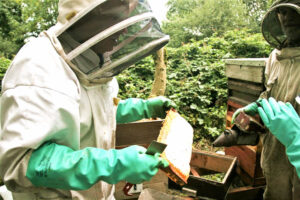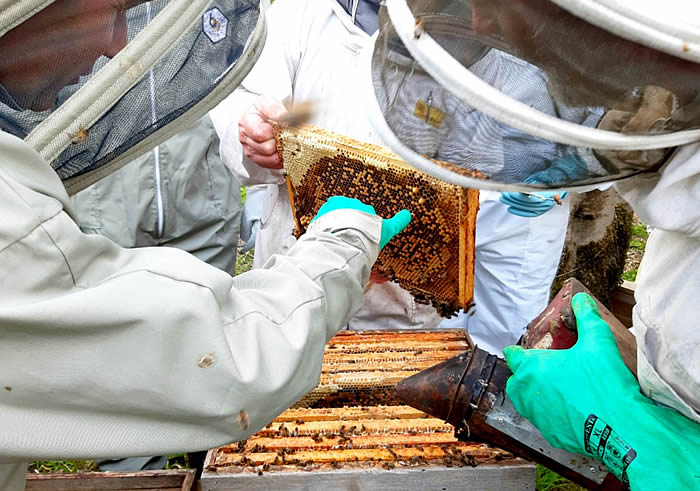Beekeeping is what you make of it. An absorbing and entertaining hobby that you can’t stop talking about whether or not it bores your friends or you can make it a full-time job and make a small income from it. Yes, I said small. There is not much money in it so if you choose it as a profession, don’t expect to make your first million from it. There is an old saying in beekeeping, “If you want to make a small fortune in beekeeping, start with a large fortune.”
But, it often happens that the hobbyist keeps growing the number of colonies until s/he could be considered a semi-professional. But by then it will have completely taken over their lives at certain times of the year and they think about nothing else the rest of the time.
Do you have the bug or do you want to get the bug? If so, you cannot just walk out and start catching bees and gathering them into a box. There is a bit more to it than that. You first need to learn some of the basics of beekeeping. You don’t have to get all scientific, but learning a bit about the life of bees and how you can support them and get yourself a little honey at the same time will be very useful.
Pests Diseases and Illnesses etc.
 For instance, would you know if your bees were sick or infected with a virus or inhabited by a pest? Would you know if they were getting enough to eat or if their queen was healthy? What you do if the answer above was no? These are all things that a few short lessons at your local beekeepers’ association can help you with and more. So, we highly recommend that you join a FIBKA affiliated association before getting started.
For instance, would you know if your bees were sick or infected with a virus or inhabited by a pest? Would you know if they were getting enough to eat or if their queen was healthy? What you do if the answer above was no? These are all things that a few short lessons at your local beekeepers’ association can help you with and more. So, we highly recommend that you join a FIBKA affiliated association before getting started.
What would you do if you had angry bees? What would you do… well you get the message. We could keep going.
Coronavirus / Covid-19
Of course, beekeepers are still keeping bees in spite of the pandemic, but their clubhouse activities have been somewhat reduced since there is a great necessity for caution and most associations do not have the space to accommodate proper social distancing. Many associations are now considering running their beekeeping classes online and bring the attendees in for the hands-on practical lessons in small groups after that, a wonderful idea. So don’t be afraid to get in touch with an association near you and talk to them about your options.
What does a beekeeper need to know?
You can’t just throw your bees in a box and come back when you think there might be some honey in there, even if you have the latest and best bee suit that fashion has to offer. Bees need to be maintained and cared for. At some times of the year, they need to be inspected weekly and other times only a quick check every couple of weeks. The idea is to try not to disturb them too much while keeping informed of their condition as much as possible.
There are some dangers associated with beekeeping. One of which is avoiding the queue at your door looking for real local honey. No, just joking. Some people are allergic to bee stings. Yes, bee stings. Beekeepers get stung. Maybe not every time they visit their bees; sometimes they don’t get stung at all and other times they get stung several times in one visit.
The real danger is not the bee sting, but your reaction to it. Some people are allergic to venom and can react badly with sometimes fatal consequences. You need to be able to recognise the symptoms and how to deal with the situation if it arises.
Did you know that you need to fulfil certain conditions to be allowed to sell honey in Ireland? Again your local association can guide you. The laws are quite strict but fair and need to be obeyed if you intend to sell honey.
Another beginner’s mistake is placing the hive in the wrong place. Where would you put your hive? Conveniently placed beside your back door or miles away in a field in the middle of nowhere?
Some Questions Beginners Don’t Realize They Need to be Answered Before They Get Started? (Beekeeping FAQ)
- Where would you get bees and when?
- Where would you buy your beekeeping equipment?
- What would you buy?
- What size or type of hive would you buy?
- How many hives?
- Would you paint your hive?
- If so, what would you use to paint it?
- Would you paint the inside and or the outside of your hives and why?
- If you think your bees are hungry, what would you feed them, how much and how often?
- What should you wear when visiting your bees?
- What is a hive tool and what do you use it for?
- If your bees produce honey, how much can you take?
- How do you harvest the honey and how much?
- Now that you have removed the honey from the hive, what do you do with it? How do you get honey from the comb into the jar?
- Where do you get jars?
- What else can you harvest from the hive and how often?
- How many types of bees are there? Which one should you have in your hives and why?
- Can you improve the quality of your bees in the same way that farmers do with their cattle? If so, how and should you do it?
- What pests should I look out for?
- How would I recognise a diseased bee or colony and then what should I do?
 These are just a few questions that can be answered by attending a beekeeping course at your local FIBKA association and meeting experienced beekeepers, online or offline. But not only that, beginners often learn much from each other by sharing their mistakes and what they did to correct them while chatting.
These are just a few questions that can be answered by attending a beekeeping course at your local FIBKA association and meeting experienced beekeepers, online or offline. But not only that, beginners often learn much from each other by sharing their mistakes and what they did to correct them while chatting.
Not only that, many beekeepers have made lifelong friendships with the beekeepers at their association. So if you need a bit of company join your local beekeeping association as soon as you can. Classes usually start in spring, but you can join and get involved any time of year. And learn some of the tips and tricks before doing the classes or getting your own bees.
Last Thing
You don’t have to have bees to be in a beekeeping association, but you will probably be infected by the enthusiasm of those who have bees and run out and buy your own.
